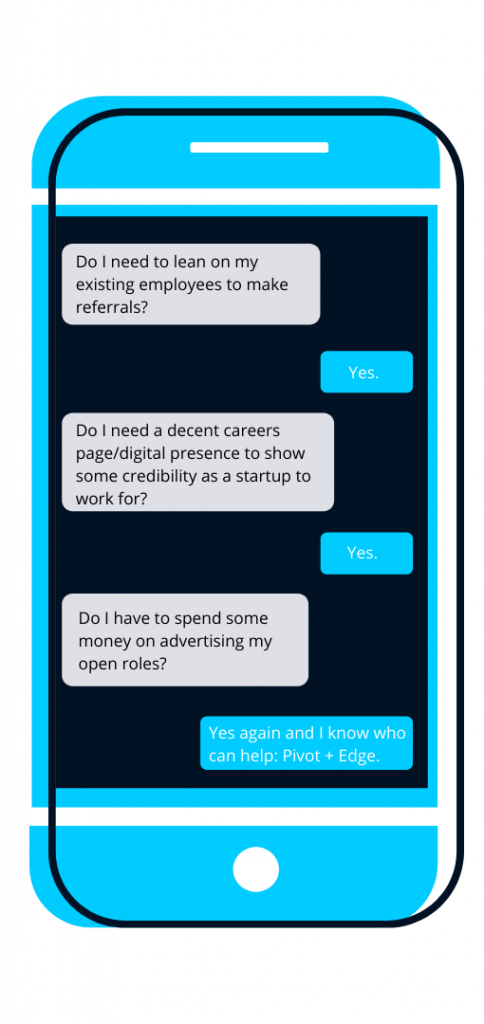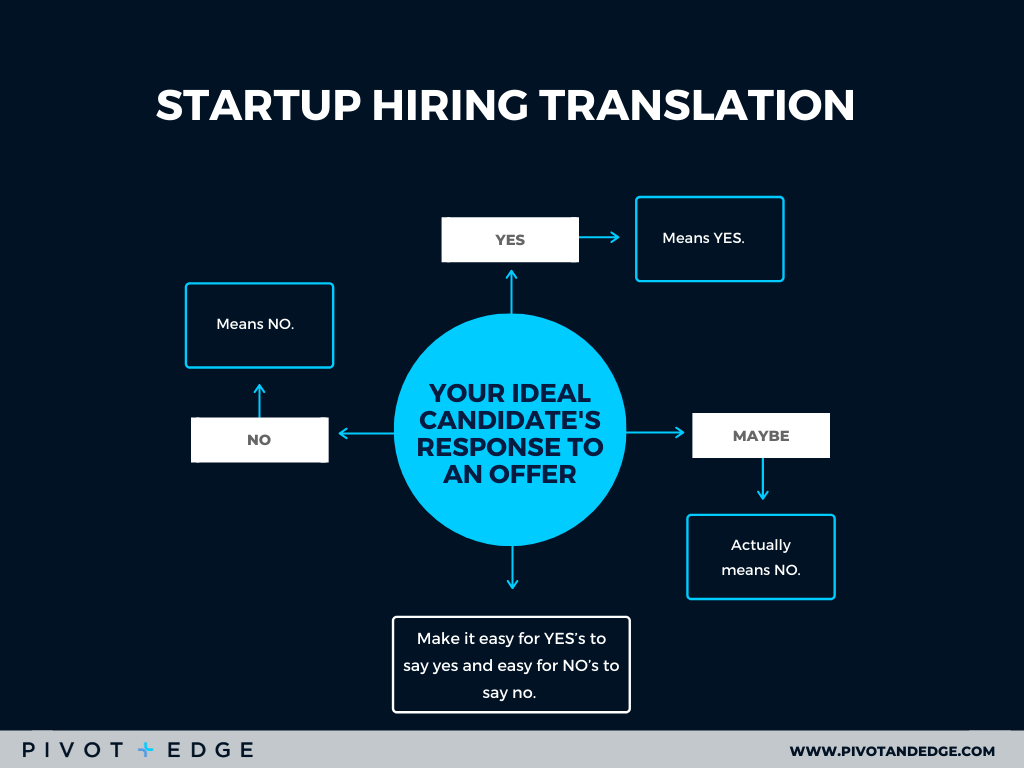Hiring a software developer at a startup really has two phases and comes down a few key best practices. Here’s exactly how you can grow your Seed and Series A company with talented software engineers.
Just as a preface, I’m not a technical person. I don’t pretend to understand algorithms, the only Java I am familiar with comes in the form of hot brown water, and as far as I understand, the internet is a magical world run by a wizard hiding behind a giant green curtain.
That being said, you don’t need to be a technical person to know how to successfully attract and hire software engineers, and I’ve helped over 50 startups get this right in the recent past, so at least some of what I’m about to share should be applicable to you.
As the CxO of your startup, you’re busy as hell, you’re juggling more balls than you can count, and the last thing you have an excess of is free time in your calendar.
The following is intended to be a guide that you can follow to the letter (or action the pieces that work for you) to allow you to maximize your software engineering hiring while minimizing your headaches.
There are two phases of hiring a great software engineer:
Successfully hiring software engineers (especially at scale) is really a two-phase process: phase-one is attracting them and phase-two is actually hiring them.
But before we get there, let’s take care of some important housekeeping items because getting this right is going to save you a pile of time, money and headaches in the long term; getting this wrong is going to land you in a never-ending downward spiral of hiring headaches and paying recruiting agencies a pile of money (that you likely don’t have or want to spend) to convince average software developers to join your startup.
But first, let’s have a tough-love moment. As a CxO, you’ve likely visualized the unicorn your startup can become one day. You likely have a 10,000-foot view of what your journey to success looks like, but in order to successfully hire software developers to your startup, there’s a number of housekeeping items you’re going to want to get sorted out first. Addressing what I’m about to lay out for you will provide the following:
- Long-term savings in time
- Refuge from recruiting agencies and their sky-high fees for services
- Far fewer pounding headaches
- Less stress sweat (It’s the worst kind!)
- More superstar software engineers for less effort
Do this before trying to hire a software developer for your startup:
Take a good, hard look at your baby, and figure out if it is “breathtaking” or “ugly.”
Yes, I’m a huge Seinfeld fan, and yes, I recently re-watched the episode where the crew went to the Hamptons to see their former neighbor’s baby. If you haven’t seen it, I highly suggest you find it on your favorite streaming service as it’s one of the best 22 minutes of comedy history.
When we are so close to our own creation, it is easy to view your startup with rose-colored glasses. But the reality is that you’re already pot-committed to your startup and your challenge is now attracting net-new engineers that have likely never heard of you (yet).
8 questions to ask yourself before hiring a software developer for your startup:
From my 15+ years of experience living in this world (as a gross generalization), software engineers care and pay attention to the following more than anything else while considering new employment with a startup:
- What is the technical challenge I would get to help solve by joining this startup?
- What is this startup’s existing financial runway?
- Is there a (big) market for the product I’d be building? And if so, will people pay for it?
- What is in it for me financially?
- Who would I get to work with every day?
- What is the startup’s work location policy?
- What tech stack has the startup committed to?
- What will I learn by joining this startup?
If your answers are similar to the ones in this list, your startup is “breathtaking” in the eyes of a software developer:
- A big one. The bigger the better.
- 12-18 months as a minimum.
- Absolutely, yes. We are generating revenue already and have early signs of product/market fit but haven’t had our “hockey stick” moment yet.
- Lots. Above market in terms of cash, but also equity and skin in the game.
- Really awesome, and wildly intelligent engineers that have no time for politics and really want to win.
- Employee’s choice.
- A modern one.
- Lots.
Whereas if you answers look more like these, it’s likely your baby is probably “ugly” in the eyes of potential software engineers:
- A small one, or one that 10+ other companies have already solved.
- What’s a financial runway?
- I’m an optimist, so… yes. I’m pretty sure, yes. I hope so. We’ll see.
- Average market salary and no equity.
- The best folks we can afford.
- We require everyone to work in the office everyday under the guise of building culture, but in reality, I’m a control freak and don’t trust my employees.
- One that I’m comfortable with and don’t try suggesting anything new.
- We’re mainly focused on people that have already been there and done that within our context, so I’m sure you will learn something, but I can’t really put my finger on it at this point.
I don’t want to be a Debbie Downer here, and it is not always possible in every startups’ context to score a perfect 8/8 on “breathtaking” answers, but if you feel as CxO you can honestly answer at least 5 of these questions in a positive light, you’re better off than most of your competitors (for talent).
For all of the questions you had “ugly” answers to, I strongly recommend that you revisit your mindset on those because you’re fighting an uphill battle for talent. Ultimately, if you are not an appealing option for software engineers, you’re already dead in the water.
The reality is, if your engineers get to solve big problems, are servicing a massive market, are granted the potential for personal financial gain, get the opportunity to work with like-minded people, have the freedom to choose where they work, have the ability to work with a modern tech stack and have the opportunity to learn something relevant to their development, then your startup is in immaculate position to hire great software engineers.
Now that we’ve got the housekeeping sorted and you know what you need to do before starting to hire a software developer for your startup, let’s get into phase-one: attraction
How to attract and hire software engineers to your startup

It will be less painful if you think of attracting candidates like a fishing enthusiast; if you want to catch a salmon, you can’t just go to your local pond with a makeshift fishing pole and shove a Cheeto on the hook. You have to fish where the fish are, you have to use the right equipment and you have to use the right technique to achieve your end goal.
Once you’ve set yourself up for success, here’s the secret sauce that no one is telling you about, but works like gangbusters 99 % of the time, every time – START A TECHNICAL BLOG. Sorry for the all-caps but you just need to. Like, now. Actually, more like yesterday.
I know you likely don’t have time or feel you don’t have time to give back to the technical community at this stage of your startup’s development. Heck, I don’t want to put part of my paycheck each week towards my retirement, nor do I want to go to the dentist every six months, but it is the right thing to do. So, start a technical blog to attract better software developer candidates. Just do it.
If you don’t feel equipped to do it, there are lots of services that can help you in this regard, Pivot + Edge included.
Starting a technical blog may sound like a chore, but it is literally the best investment you can make as a CxO in regards to continually having a funnel of awesome software engineers that:
A) Know who you are
B) Want to help solve the technical challenge you are solving
C) Would genuinely consider working for you
Again, just do it. To attract great people, you need to be visible to them and the best way to be visible to the software developers you want is through a technical blog.
Along with the blog, this also means getting your “Help Wanted” sign out via the most impactful channels and actively putting your startup’s best foot forward on the most relevant channels.
Phase two is evaluating and hiring the “best fish” that bite. Yes, just when you thought we were done with that fishing analogy, we’re back at it. Also, while we are here—thanks for getting this far in the blog. And you’re welcome for what’s coming next.
Once you’ve got a bite on the hook, the best thing you can do is to reel it in with a clear and concise process.
I don’t want to go too deep in the fishing analogies here, but the longer you leave that salmon on the hook, the higher the likelihood of that prize setting itself free becomes your reality. Having a clear and concise process for interviewing great software developers is a must.
How to interview software developers for your startup (the right way)
Keep it simple. I get it, you’re highly intelligent and have made a career by proving that to others, but as it relates to people, the simpler (and more obvious) the selection process, the better.
I can’t stress this enough; you can increase your likelihood of winning great software developers by being transparent with each hiring step a candidate will need to go through before joining your startup.
If you want to have three conversations with an engineer and then do a technical assessment, great. If you want to have two conversations with an engineer and then do a technical assessment, great. If you want to have one conversation with an engineer and then do a technical assessment, also great.
No matter what software developer interviewing process you land on, proactively communicate it to your potential new hire so they know what to expect. No one wants to be left in an information black hole and if you’re really going to ask your potential new hires to jump through some serious hoops before making a call on them, consider paying for their time.
If you consider the time investment you are asking of them to make to your selection process, is $100 for their time really going to sink you or your startup? Don’t get me started on the topic of paying folks for interviews. I’m all for paying folks to interview with my startup. It keeps me honest and keeps me focused on only interviewing folks that I feel have a high potential to accelerate my company’s growth, but that’s another article for another day.
Once you have landed on a software engineer that fits your niche, it is important for you to make it as easy as possible for them to say “yes” to joining your startup.
What software engineers really want to know about your startup before accepting an offer
As a CxO, it is your job to be prepared to provide specific feedback on how and why you feel a potential software developer would be an addition to your business. By showcasing what we at Pivot + Edge call, “The Give and The Get” of joining the company, you’ll be more likely to get that confident “yes” from your top software developer candidate.
Understand their own professional goals and relate your company’s goals back to them. I could overengineer this, but if you have software developer on the line (last fishing analogy, I promise) that you think can help make your startup successful, preemptively address all their question and make it easy for them to give you that “yes.”
As a rule of thumb, when it comes to startup hiring, I live by the following mantra: Yes means YES. Maybe means NO. No means NO. Make it easy for YES’s to say yes and easy for NO’s to say no.
Avoid doing this while hiring a software developer for your startup
The last thing you want to do as a startup CxO is build a team of “maybes” so, take your time and be diligent with your selection process (while still moving fast) to make a definitive call.
Software at the root level may just be a bunch of ones and zeros, but software engineers are living, breathing, and remarkably intelligent human beings. One of the biggest mistakes I see CxOs making while hiring software developers is forgetting that.
Treat software developers well, and they will reciprocate. A friend of mine – Robert St-Jacques – once said, “The war for talent is over… talent won,” and I completely agree with him. In order to win highly skilled software developers who are highly sought after by bigger, better, and more funded organizations, you need to stay human.
Yes, you’re behind the 8-ball. But fear not.
Use this guide for hiring software developers as your yellow brick road. Because if you put in the time and effort to pivot your startup’s employer brand, job postings and internal resources, then when the time comes to recruit, all that’s left to do is trust the process. You’ll be skipping down the path and clicking your heels together in no time. After all, there’s no place like home.








